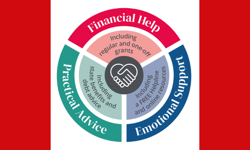When I started out as a journalist on the Wakefield Express, a weekly newspaper close to my home town of Barnsley, the deal was a straightforward one. What was then the Yorkshire Weekly Newspaper Group promised to pay me, train me, and provide me with the tools of my trade: a telephone, a typewriter, and a notebook and pen. In return, I promised to write articles that I hoped would change the world.
I never really thought about circulation figures, beyond convincing myself that a significant number of people read what I wrote. I occasionally walked through the press room and chatted to printers as they pasted “bromides” onto the page (these were the days of web offset printing). If I thought about the cover price, it was only insofar as it might affect the number of people who read what I wrote. I certainly never thought much about how the newspapers were distributed, about the individuals and companies that advertised in them, nor about the business model upon which my livelihood relied.
The four years I worked on the Wakefield Express were most rewarding in a newspaper career that lasted more than 20 years, until I became the first national newspaper journalist to leave for the internet in the mid-1990s. By way of the Western Morning News in Plymouth, I had arrived in Fleet Street - or rather Vauxhall Bridge Road – as education correspondent on Today newspaper, the first “new technology” newspaper, in 1986, before moving to the Sunday Times, where I was news editor and assistant editor, and the Daily Mail, where I was senior investigative reporter.
It was at the Daily Mail that I - with my son, then aged 12 - created Soccernet in 1995; four years later, it was the world’s most popular football website and was sold to ESPN for $40 million. Then, we launched Schoolsnet, an education website giving details about every school in the country; it was sold in 2003 to a company co-owned by Jeremy Hunt, now the Secretary of State for Culture, Olympics, Media and Sport.
More recently, since leaving Telegraph Media Group - where I was head of digital development until last year - I have frequently been invited to share my views on the future of newspapers in a digital age. Briefly, these are that newspapers are dying (but not dead), their demise accelerated by lack of innovation by dysfunctional, monolithic media companies to whom individual entrepreneurialism and enterprise are anathema. That even the most successful media companies are merely digging their graves more slowly than less successful rivals.
Betrayal of trust
In recent times, I have focused my thoughts on what we usually refer to as local or regional newspapers. At the same time, I have sharpened my opinions. Put bluntly, I believe the many of the businesses that run local newspapers are guilty of serial breaches of trust. They have violated the trust of journalists - by paying them poorly, equipping them badly, and failing to provide a viable platform on which they can exercise their journalism; they have violated the trust of their communities - by cutting costs and withholding investment, thus failing to satisfy the democratic needs of active and informed citizens; finally, for what it’s worth, a number of executives appear to have broken faith even with shareholders, by seeking to suck as much value as possible out of a moribund industry - in salaries, pensions and share options - while privately recognising that the game is up. That the party is over.
The world has changed. And media companies have failed to re-invent themselves to take advantage of an unprecedented level of disruption.
So what is to be done? And where to begin?
First of all, I would like to narrow the focus. We often talk of local or regional newspapers, on one hand, and national newspapers, on the other.
City newspapers
Here, though, I would prefer to concentrate on city newspapers. Specifically, I would like to concentrate on newspapers that serve the 20 or so English cities that have populations of 250,000 or more and are either unitary authorities or metropolitan districts.
In other words, my focus is on urban agglomerations where citizens have as much control over local affairs as our form of democracy allows and where there are enough people to fuel a sustainable local economy. It is no coincidence that the list includes many cities where the government entertains hopes of local television channels.
My interest in cities goes back a long way. All the way back to Aristotle and his assertion that “Man is a political animal”. By that, he meant human beings are social animals suited by nature to live in a “polis”, a city-state such as ancient Athens - which, by coincidence, had a population of roughly 250,000.
Cities have existed for only 6,000 of the 160,000 years that humankind has walked the Earth. By 2050, 70 per cent of the world’s population will live in cities. Yet the internet has existed for 50 years at most; the web for less. The future belongs to cities - connected cities, where free, high-speed wireless internet connectivity will be ubiquitous. That much is certain.
Back to the here and now: 20 English cities, with an aggregated population of more than seven million, where five companies control newspapers that struggle to reach one in five people. For the record, the cities that I am interested in are (excluding the special case of London and in descending order of population): Birmingham, Leeds, Sheffield, Bradford, Liverpool, Manchester, Bristol, Wakefield, Coventry, Nottingham, Leicester, Sunderland, Newcastle, Brighton and Hove, Hull, Plymouth, Wolverhampton, Stoke, Derby, and Southampton.
You do not need me to tell you that print circulations - and revenues and profits - are spiralling downwards. Inevitably. Inexorably.
The five companies that control the main local newspaper in these cities are: Northcliffe (seven); Trinity Mirror (five); Johnston Press (four); Newsquest (three); and Midland News Association (one). Every major regional newspaper group has “skin in the game”.
For more than 25 years, I have lived in what is now the city of Brighton and Hove, where Newsquest owns the Argus - a newspaper that, for its coverage of the IRA’s bombing of the Grand Hotel in 1984, had earned it the accolade of a British Press Award shortly before I arrived with my family. I, too, have skin in this particular game.
Consequently, I spend a lot of time pondering what the media landscape will - could? - look like in my home city in, say, five or 10 years. Indeed, what would I like it to look like in, say, 2020?
Semantic web
As director of strategic projects at Cogapp, a digital agency with world-class clients, I have many passions. The greatest of these is the semantic web - as envisioned by Sir Tim Berners-Lee, the creator of the current web: a “web of data” to supplement the current web of documents, an enhanced web in which computers understand and make sense of linked data published across the internet in machine-readable, non-proprietary formats.
To be honest, newspapers are not really too interested in semantic web technologies and what they might achieve. Just as they were not very interested in hypertext mark-up language and file transfer protocol in the mid-1990s. But they should be.
Sir Tim’s vision has helped to inspire a new worldwide phenomenon: the rise of “open-data cities”. Spreading from North America, cities such as San Francisco, Washington and New York - and now Brighton and Hove - have responded to Sir Tim’s call for “raw data now”.
Cities that “think like the web” are building a 21st-century world that is characterised less by a patchwork of nation states, and more by an inter-connected network of networked cities.
Brighton and Hove - like other open-data cities - believes “the value of public data is greatest when it is freely and openly shared, without unnecessary licensing restrictions”. All political parties in the city have signed up to an open-data manifesto that envisages “a city in which every individual and business can use and re-purpose public data to help create a more vibrant and sustainable future, with more efficient public services, more effective voluntary organisations, and more enterprising private businesses”.
Open data
For me, linked open data is a third digital epiphany: the first was the web in 1994; the second was online social networks and “thefacebook.com” (which I first saw in 2005 when my son was in the year beneath Mark Zuckerberg at Harvard University); the third came in the run-up to last year’s launch of data.gov.uk and the release of government data.
If I and thousands like me around the world are correct, what are the implications for the Argus and 19 other big-city English newspapers? Crucially, what should they be doing to ensure they are in the best position to grasp what could be their last lifeline?
Most urgently, they need to join the conversation. They should engage with the individuals and start-ups - often in their own localities - who are experimenting with new technologies, especially those related to linked data and the semantic web.
Furthermore, they must stop trying, in Marshall McLuhan’s words, “to do today’s job with yesterday’s tools and yesterday’s concepts”. Cutting costs, cutting jobs, centralising production processes (including templated one-size-fits-all websites), and moving offices from the city-centre to the suburbs have resulted in city newspapers becoming peripheral, even irrelevant.
The opportunity
But there is hope. Even in a world dominated by Google, Facebook, Twitter, Foursquare, and Groupon, city newspapers remain uniquely well-placed to serve the needs of their local communities. None of the digital behemoths can rival their local knowledge; none can establish relationships with local businesses as rich as those built up over decades by local newspapers. None can hold local democratic institutions to account as effectively - or work with them as intimately - as local journalists and other active citizens. Not yet.
As is the case with all disruptive technologies, those associated with the semantic web offer opportunities as well as threats. For city newspapers, though, the stakes have never been higher in a succession of last-chance saloons.
Open-data cities will change the future in ways that are as inconceivable now as Google and Twitter were when the worldwide web was in its infancy, less than 20 years ago. In cities where data “flows like water” - and where people, places and things exist digitally as much as they do in the real world - the media landscape will be transformed.
Huge amounts of data - or digital “stuff”, as I prefer to describe it - will be widely and freely available: real-time transport data, education data, housing data, crime data, geo-location data, data about boundaries, buildings and bus-stops, roads, lamp-posts, parks, and trees. The list is endless.
Cities will begin self-consciously to generate data - to capture and curate data to identify the needs of citizens and to inform the means necessary to meet those needs. The pattern of bus journeys by passengers using swipecards is an obvious example. Another might be what is called in the United States a “311 service”, a means by which citizens with non-emergency needs can access the information they require about public and community services, in an easy and speedy fashion.
Data generated by citizens using such services can identify gaps in provision, build a knowledge base for immediate use, and inform strategic solutions in the longer term. Quite literally, data can give a voice to the voiceless - much as past generations of journalists have done.
In such circumstances, city newspapers could re-invent themselves. They could cease to be products; instead, they could become providers of data-driven services - not only on the web, but also on every device imaginable, including internet-enabled television sets in every living room.
They could catalogue and collate the data, publish the data, store the data in “data mines”, visualise the data, enhance the data, and link the data from which services yet to be dreamed of will be built, for the benefit of local businesses as well as consumers.
This, however, will require traditional media companies to re-invent themselves, to re-establish trust with their employees, partners and communities, and to work with public and private organisations of all sorts.
Once again, they must invest in journalism, journalists, and journalistic enterprise; they must give their journalists the tools and the technologies to do the job, to meet the needs of their communities. They must not outsource innovation - but they must accept they will need outside help to be successful.
If they do this, if they work with those striving to shape the future of our open-data cities, they could once again put themselves at the heart of the communities they seek to serve.










